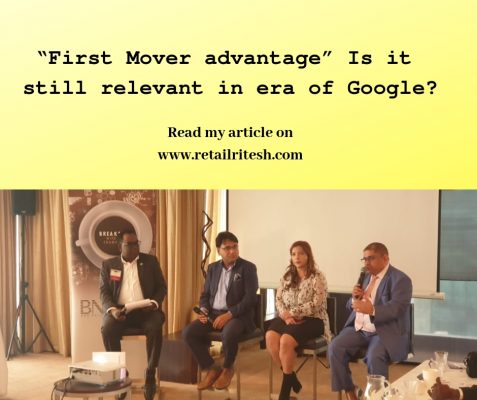“First Mover advantage” Is it still relevant in era of Google?
First mover advantage – A Myth.
We all have heard about “First mover advantage” but is it still relevant in times of digital disruptions being brought out by Google.
I was asked this question in one of the panel discussions in which was participating along with distinguished experts in retail.
My reply was- First mover advantage is no longer applicable in today’s business and it has transformed itself into “Fast Mover advantage”.
My answer stumped the audience and I went to explain the concept of “Fast mover advantage” using an example of Google.
Google was not the first search engine.
There were search engines prevalent before Google search came into existence.
Bing and Yahoo were the leaders in the search domain.
Google studied the lack of speed and optimization of search results and came out with their search engine which rules the category as I pen down this article.
What led to Google’s success?
The answer lies in Google’s vision statement which states: “Google stands for boundless innovation and relentless growth.”
Their success can be attributed to the adoption of OKRs (objective and Key results) which has been a part of Google’s culture.
I shall write an article soon on “what is corporate culture and whether it can be installed?” soon in my series of leadership articles.
Consider Gmail. The main problem with earlier web-based email systems was poor storage limit, typically 2 to 4 megabytes.
Users were forced to delete old emails in order to make room for new ones.
Archives were a pipe dream.
Google- Assessment of pain point for email users
In 2004, when Google launched its email service, they offered 1GB of storage, up to 500 times more than their nearest competitor.
Digital communication changed forever.
The result, we all know it.
Google’s Gmail rules the digital communication sector.
The concept of 10X was born.
Learn the concept of Value Innovation, Read here.
What is 10X?
Google Gmail did not change anything.
But reinvented the category and outplayed its competitors.
As per Larry Page, a ten percent improvement means that you are doing the same thing as everybody else.
You may probably not fail. Although, you are guaranteed not to succeed wildly.
That’s why Google wants its employees to create products and services that are 10X (10 times) better than the competition.
10 times (10X) improvement demands complete Rethinking, Redefining the problem, Exploring what’s technologically possible, and Having Fun in the process by not fearing to fail.
Read my article on leadership skills here.
Case study: Air Arabia airlines.
Being a frequent flyer with Air Arabia (a low-cost airline), I always wanted to study the business model which goes far beyond the Low-cost airline operating model.
The management concept as per my views (as a strategic thinker and Marketer) is Focus on what won’t change.
The core of business should be based around parameters that won’t change with time.
Things that people are going to want today and ten years from now.
Those are things you should invest in.
Amazon.com focuses on free or fast deliveries, great selection, friendly return policies, and affordable prices.
These things will always remain in demand.
Japanese carmakers focus on core principles of Reliability, Affordability, and Practicality.
Things like travel at low cost, reaching your destination on time, and safety are the parameters that shall always remain unchanged.
Air Arabia was fast to recognize this trend, they fly all A320s which means they don’t need to hire pilots and technicians with multiple skillsets of different aircraft.
The same crew can be utilized on another aircraft which means lower operating costs.
The same spare parts and inventory management systems eliminate the need for different spare parts as the same parts are utilized on any aircraft within the fleet.
That’s what I call 10X growth.
Thinking by asking yourself a question – ” What if we have to restart everything from scratch? How differently can we operate?”
If you are a business owner for instance and want a clear strategic review of your business from a fresh perspective to drive growth.
It would be my pleasure to help my retail fraternity with my strategic inputs.
I can be reached at riteshmohan@yahoo.com
watch my video here, wherein I share my views of participating in one of the Retail panel discussion.

Reference books: “Measure what matters” by john Doerr and “Rework” by Jason fried.
About the author:
Ritesh Mohan is a passionate retail professional with over 20 years in the Retail sector, handling some of the biggest brands in beauty, fashion, and fragrances retail & FMCG sector. Ritesh has been instrumental in the growth of some of the regional brands as well in the Middle East region. He specializes in Retail management, Product development, and Brand Management, Retail Operations, Sales Management and Franchising & Business Management. He strongly believes in empowering business owners with his wisdom & experience of around two decades in the industry.

